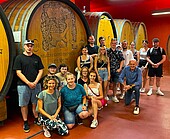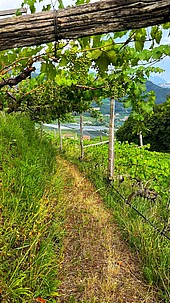It was with great pleasure that 16 students from the Neustadt Wine Campus traveled to South Tyrol this year. Part of the excursions was an examination of the topic: "How is climate change changing wine production?". With this question in mind, the students had the opportunity to learn about alternative training systems for vineyards, including traditional pergola training, which has been used in South Tyrol for many years and offers clear advantages in terms of climate change. South Tyrol is one of the smallest but most diverse wine-growing regions in Italy, with 5,400 hectares of vineyards in various climatic zones and altitudes.
The students were accompanied by their Professor of Oenology and Process Technology, Prof. Dr. Lena Keller, and Valeska Gerhardt, who planned and organized the excursions.
To delve deeper into the topic of "How is climate change changing wine production?", the students visited numerous wineries in South Tyrol. These included the Alois Lageder winery, a pioneer of organic viticulture with PIWI grape varieties, the Arunda sparkling wine cellar, which produces sparkling wine at 1,200 meters above sea level, and one of the best-known women-run wineries in Italy, the Elena Walch winery. The balancing act between tradition and innovation became clear, for example at the Tramin winery with its famous Gewürztraminer, while the Manincor winery focuses on organic farming and sustainability. A particular highlight for the group was the fact that the cellar master at Manincor is a former student of the Neustadt Wine Campus. There is also the Castel Juval winery, which expresses the uniqueness of the Juval hill on 4.3 hectares of steep slopes. At the Degree, the students visited the Landesweingut Laimburg, a research facility that presented exciting projects on so-called "wines of the future" (PIWI grape varieties).
Text & pictures: Paul Eichberger & Pascal Millen






